反意疑问句_精品(1)
反义疑问句
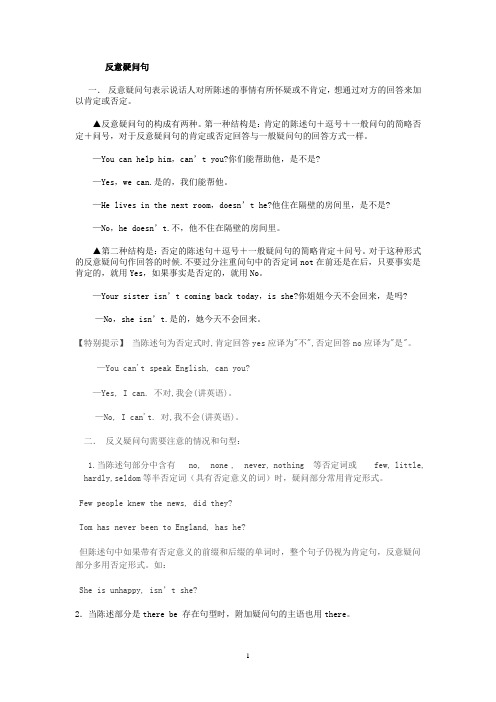
反意疑问句一.反意疑问句表示说话人对所陈述的事情有所怀疑或不肯定,想通过对方的回答来加以肯定或否定。
▲反意疑问句的构成有两种。
第一种结构是:肯定的陈述句+逗号+一般问句的简略否定+问号,对于反意疑问句的肯定或否定回答与一般疑问句的回答方式一样。
—You can help him,can’t you?你们能帮助他,是不是?—Yes,we can.是的,我们能帮他。
—He lives in the next room,doesn’t he?他住在隔壁的房间里,是不是?—No,he doesn’t.不,他不住在隔壁的房间里。
▲第二种结构是:否定的陈述句+逗号+一般疑问句的简略肯定+问号。
对于这种形式的反意疑问句作回答的时候.不要过分注重问句中的否定词not在前还是在后,只要事实是肯定的,就用Yes,如果事实是否定的,就用No。
—Your sister isn’t coming back today,is she?你姐姐今天不会回来,是吗?—No,she isn’t.是的,她今天不会回来。
【特别提示】当陈述句为否定式时,肯定回答yes应译为"不",否定回答no应译为"是"。
—You can't speak English, can you?—Yes, I can. 不对,我会(讲英语)。
—No, I can't. 对,我不会(讲英语)。
二.反义疑问句需要注意的情况和句型:1.当陈述句部分中含有 no, none , never, nothing 等否定词或 few, little, hardly,seldom等半否定词(具有否定意义的词)时,疑问部分常用肯定形式。
Few people knew the news, did they?Tom has never been to England, has he?但陈述句中如果带有否定意义的前缀和后缀的单词时,整个句子仍视为肯定句,反意疑问部分多用否定形式。
反义疑问句归纳

反义疑问句归纳1)陈述部分的主语是I,疑问部分要用aren't I。
例如:I'm as tall as your sister, aren't I? 我跟你姐一样高,对吗?2)陈述部分的谓语是wish,疑问部分要用may +主语。
例如:I wish to have a word with you, may I? 我想与你说句话,行吗?3)陈述部分用no, nothing, nobody, never, few, seldom, hardly, rarely, little等否定含义的词时,疑问部分用肯定含义。
例如:Some plants never blown (开花), do they ? 有些植物从不开花,对吗?4)含有ought to 的反意疑问句,陈述部分是肯定的,疑问部分用shouldn't / oughtn't +主语。
例如:He ought to know what to do, oughtn't he? / shouldn't he? 他应该知道该做什么,对吗?5)陈述部分有have to +v. (had to + v.),疑问部分常用don't +主语(didn't +主语)。
例如:We have to get there at eight tomorrow, don't we? 我们要在明天早上八点到达那儿,是吗?6)陈述部分的谓语是used to 时,疑问部分用didn't +主语或usedn't +主语。
例如:He used to take pictures there, didn't he? / usedn't he? 他以前常在那儿拍照,是吗?7)陈述部分有had better + v. 疑问句部分用hadn't you? 例如:You'd better read it by yourself, hadn't you? 你最好自己去读,好吗?8)陈述部分有would rather +v.,疑问部分多用wouldn't +主语。
常用反义疑问句

(1)everyone,no one,nobody ,everybody, anybody, anyone, somebody, someone, nobody, none, neither 时等时,后面的疑问句应表示为:Everyone is in the classroom, aren't they? (基本不用单数,但也可用he)Nobody will go, will they?(2)everything,anything,nothing,something时,附加疑问句中主语一般用it 不用they(3)this,that,或those,these时,附加疑问句中主语用it和they.A当陈述部分有never,seldom, hardly,few,little,barely, scarcely, nothing, little, not, no, no one, nobody, nothing, none, neither 等否定意义的词时,后面的反意疑问句则为肯定形式:There are few apples in the basket, are there?He can hardly swim, can he?They seldom come late, do they?B当陈述部分含有否定意思的词是unhappy,dislike,unfriendly等含有否定词缀的派生词,也就是有un-前缀、-less后缀等含有词缀而意思否定的词,当做肯定句处理,疑问部分要用否定形式。
如:He looks unhappy,doesn't he?他看上去不高兴,不是吗?The girl dislikes history,doesn't she?这女孩不喜欢历史,不是吗?表示主语主观意愿的词含有think, believe, suppose, imagine, expect等动词后接宾语从句构成的主从复合句在构成反意疑问句时,视情况不同有两种不同的构成方式。
中小学英语语法(反义疑问句)
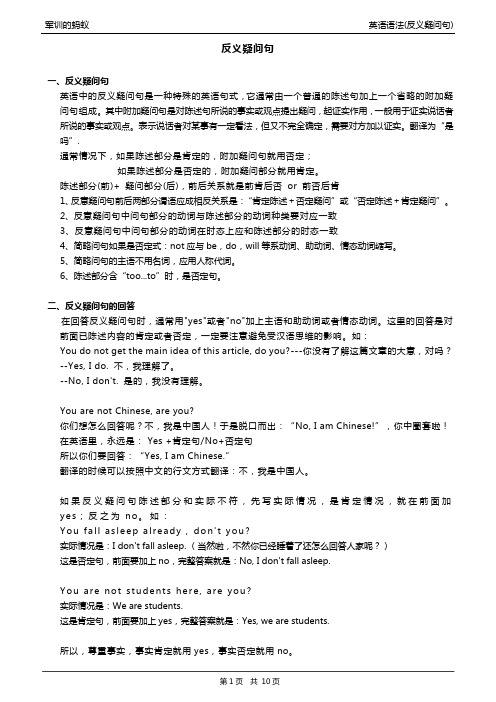
反义疑问句一、反义疑问句英语中的反义疑问句是一种特殊的英语句式,它通常由一个普通的陈述句加上一个省略的附加疑问句组成。
其中附加疑问句是对陈述句所说的事实或观点提出疑问,起证实作用,一般用于证实说话者所说的事实或观点。
表示说话者对某事有一定看法,但又不完全确定,需要对方加以证实。
翻译为“是吗”.通常情况下,如果陈述部分是肯定的,附加疑问句就用否定;如果陈述部分是否定的,附加疑问部分就用肯定。
陈述部分(前)+ 疑问部分(后),前后关系就是前肯后否or 前否后肯1、反意疑问句前后两部分谓语应成相反关系是:“肯定陈述+否定疑问”或“否定陈述+肯定疑问”。
2、反意疑问句中问句部分的动词与陈述部分的动词种类要对应一致3、反意疑问句中问句部分的动词在时态上应和陈述部分的时态一致4、简略问句如果是否定式:not应与be,do,will等系动词、助动词、情态动词缩写。
5、简略问句的主语不用名词,应用人称代词。
6、陈述部分含“too...to”时,是否定句。
二、反义疑问句的回答在回答反义疑问句时,通常用"yes"或者"no"加上主语和助动词或者情态动词。
这里的回答是对前面已陈述内容的肯定或者否定,一定要注意避免受汉语思维的影响。
如:You do not get the main idea of this article, do you?---你没有了解这篇文章的大意,对吗?--Yes, I do. 不,我理解了。
--No, I don't. 是的,我没有理解。
You are not Chinese, are you?你们想怎么回答呢?不,我是中国人!于是脱口而出:“No, I am Chinese!”,你中圈套啦!在英语里,永远是: Yes +肯定句/No+否定句所以你们要回答:“Yes, I am Chinese.”翻译的时候可以按照中文的行文方式翻译:不,我是中国人。
反义疑问句讲解与练习

反义疑问句讲解与练习一、含be(is, are, was, were)动词的反意疑问句(1)句型1:主语+ be+其它,isn’t(aren’t, wasn’t, weren’t)+ 主语?句型2:主语+ be not+其它,is(are, was, were) + 主语?① You are from America, aren’t you? Yes, I am. No, I’m not.② It isn’t very cold today, is it? Yes, it is. No,it isn’t.(2)注意:There be句型例:There is an old picture on the wall, isn’t there?二、带行为动词反意疑问句(不含be和情态动词)句型1:主语+动词+其他,do/did/does + not +主语?句型2:主语+did/does/do+not +动词原形+其他,did/do/does+其他?例:You often watch TV in the evening, don’t you? Yes, I do. No, I don’t.三、含有情态动词的反意疑问句,反义疑问句中的动词使用情态动词。
例:The students must study hard, mustn’t they? Yes, they must. No, they needn’t.注意:You must go home now, needn’t you? Yes, I must. No, I needn’t.★注意:There be句型的一般将来时① There will be a basketball match tomorrow, won’t there?Yes, there will. No, there won’t.② There won’t be too much pollution in the future, will there?Yes, there will. No, there won’t.四、反义疑问句的回答:答语要和实际情况相符合,遵循“实事求是”的原则。
反义疑问句知识点

反义疑问句反义疑问句:在陈述句后附加一个简短的疑问句,可以表示疑问,也可以表示说话者的某种倾向,强调或反问。
反义疑问句通常由两个词组成:第一个词是be、情态动词、助动词;若为否定,not用简略形式。
第二个词是人称代词主格(与陈述句主语相同)。
例:……,can't we? 和……,can we?⑴一般情况下:前面陈述句是肯定句,后面反义疑问句部分用否定;即“前肯定后否定,前否定后肯定”。
⑵当陈述句部分有表示否定或部分否定意义的词如little,barely,hardly,rarely,scarcely,seldom,few,no,never,nothing,not等词时,反意疑问句部分要用肯定形式。
You can hardly blame Tom for leaving early, can you?你不能责怪汤姆提前离开,是吗?当陈述句部分中表示否定意义的词为含有im-,in-,dis-,un-等否定前缀或-less等否定后缀的词时,应把陈述句部分视为肯定句,反意疑问句部分要用否定形式。
(有否定意义,但不能算否定词)Tom dislikes the book,doesn't he? 汤姆不喜欢这本书,是吗?⑶陈述句主语不同情况①当陈述句部分的主语是everyone,someone,anyone,no one,everybody,somebody,anybody,nobody等表示人的不定代词时,反意疑问句部分的主语通常用he,但口语多用they;Nobody wants to go here,does he/do they?没有人想去那里,是不是?②当陈述句部分的主语是anything,everything,nothing,something 等表示物的不定代词时,反意疑问句部分的主语常用it.Everying seems all right now,doesn't it?似乎一切顺利,是不是?②当陈述句部分的主语是I 时,反意疑问句部分的主语常用aren't I.若表示征询对方意见时,疑问句部分用do you.I am healthy,aren't I?我很健康,对吗?I don't like this film,do you?我不喜欢这部电影,你呢?④当陈述句部分的主语是不定式(短语)或动名词(短语)时,反意疑问句部分的主语常用it.Learning English well takes a long time,doesn't it?学好英语需要好长时间,是不是?②当陈述部分的主语是指示代词this /that或these /those时,疑问句中的主语分别用it或theyThis is important, isn't it? 此事很重要,是不是?②如果陈述部分是以代词one作主语疑问句的主语,在正式场合用one 非正式场合用you在美国英语中非正式场合下,还可以用heOne cannot be too careful, can one /can you? 越仔细越好,对不对?②陈述部分有neither…nor 或both …and连接两个主语时,疑问句部分的主语常用复数形式。
反义疑问句英语
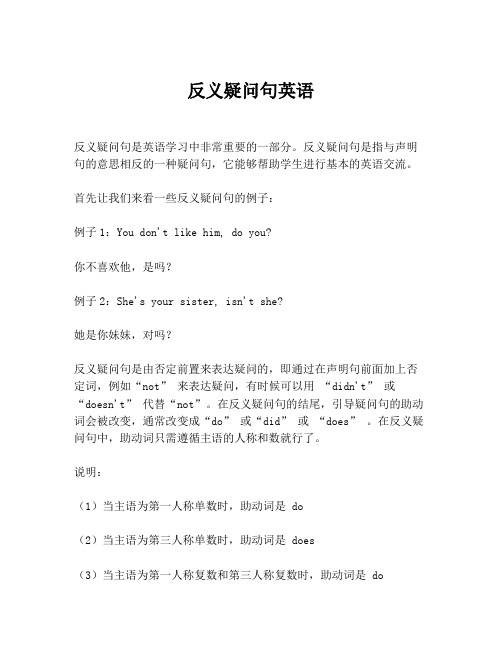
反义疑问句英语反义疑问句是英语学习中非常重要的一部分。
反义疑问句是指与声明句的意思相反的一种疑问句,它能够帮助学生进行基本的英语交流。
首先让我们来看一些反义疑问句的例子:例子1:You don't like him, do you?你不喜欢他,是吗?例子2:She's your sister, isn't she?她是你妹妹,对吗?反义疑问句是由否定前置来表达疑问的,即通过在声明句前面加上否定词,例如“not” 来表达疑问,有时候可以用“didn't” 或“doesn't” 代替“not”。
在反义疑问句的结尾,引导疑问句的助动词会被改变,通常改变成“do” 或“did” 或“does” 。
在反义疑问句中,助动词只需遵循主语的人称和数就行了。
说明:(1)当主语为第一人称单数时,助动词是 do(2)当主语为第三人称单数时,助动词是 does(3)当主语为第一人称复数和第三人称复数时,助动词是 do同时,如果要表达过去否定疑问句,助动词会变成did,所以上面例子1可以改成:You didn't like him, did you?此外,如果要表达虚拟否定疑问句(即虚拟情况的否定疑问句),也可以使用would而不是do来表达。
例如:You wouldn't want to go, would you?你不想去,是吗?至此,我们已经学习了反义疑问句的构成,生活中也可以运用反义疑问句,例如:A:I think you should stay at home tonight.我认为你今晚应该待在家里。
B: But I want to go out and have some fun.但是我想出去玩一下。
A: You don't want to stay at home, do you?你不想呆在家里,是吗?从上文中可以看出,反义疑问句不仅可以让学生掌握基本的英语交流技巧,而且在日常生活中也可以用到,这也是反义疑问句所吸引人的地方。
最新初中英语反义疑问句的用法归纳25654

反义疑问句(1)反意疑问句要点简述反意疑问句又叫附加疑问句,是在陈述句后,对陈述句所叙述的事实提出的疑问。
其基本结构有两种:一是“肯定陈述句+简略否定问句”;二是“否定陈述句+简略肯定问句”。
反意疑问句后一部分的主谓与前一部分的主谓要保持人称及助动词等方面的一致。
这种疑问句的回答要根据事实,肯定的用“Yes, …”。
否定的用“No, …”。
如:It looks like rain, doesn’t it?He doesn’t need to work so late, does he?(2)学习反意疑问句,特别要注意的问题1)陈述部分的主语是this, that时,疑问部分的主语多用it;陈述部分的主语是these, those时,疑问部分的主语多用they。
如:This is a dictionary, isn’t it?Those are shelves, aren’t they?2)陈述句如果是there be结构时,疑问句部分仍用there。
如:There once was a man named Saint Nicholas, wasn’t there?3)在英语口语中,“I am +表语结构”,后面的反意疑问句多用aren’t I来体现。
如:I am very interested in learning English, aren’t I?4)陈述句的主语是动词不定式,动词的-ing形式或从句时,疑问部分的主语多用it来体现。
如:Taking care of our environment is very important, isn’t it?What he said is right, isn’t it?5)陈述句中含有not, no, hardly, neither, never, few, little, too …to等否定词或具有否定意义的词时,疑问部分常用肯定形式。
如:Few people knew the news, did they?Tom has never been to England , has he?但陈述句中如果带有否定意义的前缀和后缀的单词时,整个句子仍视为肯定句,反意疑问部分多用否定形式。
反意疑问句 (解析版)
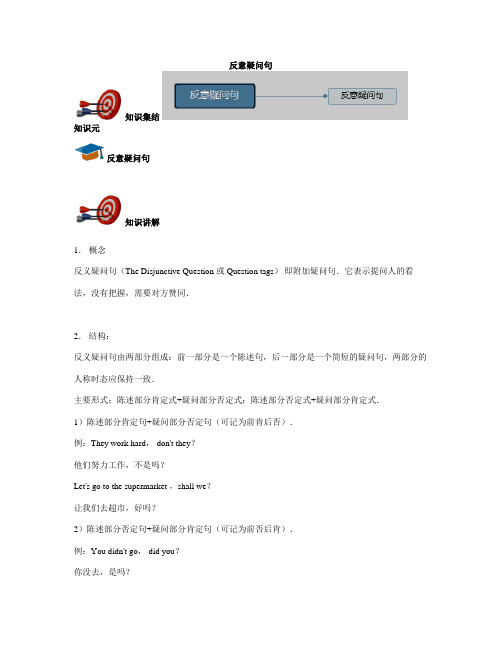
反意疑问句知识集结知识元反意疑问句知识讲解1.概念反义疑问句(The Disjunctive Question 或 Question tags)即附加疑问句.它表示提问人的看法,没有把握,需要对方赞同.2.结构:反义疑问句由两部分组成:前一部分是一个陈述句,后一部分是一个简短的疑问句,两部分的人称时态应保持一致.主要形式:陈述部分肯定式+疑问部分否定式;陈述部分否定式+疑问部分肯定式.1)陈述部分肯定句+疑问部分否定句(可记为前肯后否).例:They work hard, don't they?他们努力工作,不是吗?Let's go to the supermarket ,shall we?让我们去超市,好吗?2)陈述部分否定句+疑问部分肯定句(可记为前否后肯).例:You didn't go, did you?你没去,是吗?3.用法:1)反意疑问句的缩写问题当反意疑问句的附加部分为否定式时,习惯上只用缩写形式,不能分开来写.如:You love him very much, don't you?你很爱他,对不对?2)反意疑问句用于there be句式当陈述部分为there be句型时,附加部分仍用there be句式.如:There is a garden at the back of the house, isn't there?房子背后有一座花园,对吗?3)当 have 为助动词时,其反意疑问句沿用同样的助动词:He has already left, hasn't he?他已经离开了,是吗?4)当 have 为实意动词时,要分两种情况:①若表示"所有",反意疑问句可以用have,也可以用do:He has a lot of friends here, hasn't [doesn't] he?他在这儿有许多朋友,是吗?但是若陈述部分用的是have的否定式,反意疑问句用have 还是用do,取决于陈述部分的动词形式:He hasn't any money, has he?他没有钱,是吗?He doesn't have any money, does he?他没有钱,是吗?②若表示"吃"、"玩"等意思,反意疑问句要用do:He has supper at 5, doesn't he?他5点吃晚餐,是吗?He had a good time at the party, didn't he?他在晚会上玩得很开心,是吗?4)涉及情态动词的反意疑问句在通常情况下,当陈述部分含有情态动词时,反意疑问句会重复前面同样的情态动词.如:The boy can read and write, can't he?这男孩会读写,是吗?We shouldn't help him, should we?我们不应该帮助他,对吗?注意,当陈述部分含有情态动词must时,要分两种情况:若must表示"必须"或"有必要",则附加部分可用 mustn't 或needn't.如:You must leave at once, mustn't [needn't] you?他必须(有必要)马上离开,是吗?若must表示推测,意为"一定"时,其附加部分不能用must,而应根据must后的动词结构采用相应的动词形式.如:He must be tired, isn't he?他一定累了,是吗?He must have read it, hasn't [didn't] he?他一定读过它,是吗?He must have left yesterday, didn't he?他昨天一定走了,是吗?这三句中的must均表示推测,其意均表示"一定".第一句的must后为动词be,而句子为第三人称单数,所以附加部分用isn't he;第二句的must后为动词 read的完成式have read,表明动作已经发生过了,此时的附加部分既可与have保持一致使用hasn't he,也可与动词read何持一致使用didn't he;第三句的must后也是动词read的完成式,但由于它后面用了表示明确过去时间的状语,所以附加部分用didn't he,不用hasn't he.5)涉及祈使句的反意疑问句若陈述部分为祈使句,则其附加部分通常用will you, won't you, would you等.如:Come tomorrow, will you?明天来吧,好不好?Try it again, won't you?再试一次,好吗?但是,如果前面为否定的祈使句,则其附加问句部分要用肯定形式will you,而不能用否定式形式的won't.如:Don't tell him, will you?不要告诉他,好吗?注意,当祈使句Let's…或Let us…开头时,情况比较特殊﹣﹣由于Let's…总是表示建议,所以其后的附加部分总是用shall we.如:Let's have a break, shall we?我们休息一下吧,好不好?Let's meet on Monday, shall we?咱们星期一碰头吧,好不好?而祈使句以et us…时则有所不同,由于它有时表示请求,有时表示建议,所以要区别对待﹣﹣表示请求时,附加部分用will you;表示建议时,附加部分用shall we.如:Let us know your address, will you?请把你的地址告诉我们,好吗?Let us go swimming together, shall we?我们一起去游泳吧,好吗?4.易混淆点:1)反意疑问句的主语问题反意疑问句部分的主语应与陈述部分主语一致,且只能是代词,不能是名词.如:正:Jim likes English very much, doesn't he?吉姆很喜欢英语,对吗?如果陈述部分的主语是指示代词或不定代词等,在附加部分应改用相应的人称代词.如:That is a wallet, isn't it?这是个钱包,是吗?Nothing is serious, isn't it?一点也不严重,对吗?注意,如果陈述部分的主语为somebody, someone, everyone, everybody, no one, nobody 等指人的复合不定代词时,其附加部分的主语在正式文体中用he,在口语或非正式文体中通常用they.如:2)当陈述部分为否定式,反意疑问句为肯定式时,其回答往往与汉语不一致,需特别引起注意:"It isn't cheap, is it?" "Yes, it is." "它不便宜吧?""不,很便宜.""He doesn't love her, does he?" "No, he doesn't.""他不爱她,是吗?""是的,他不爱她." Nobody likes it, does he [don't they]?没有一个人喜欢它,是吗?5.解题方法点拨:回答反意疑问句的原则回答反意疑问句通常应根据实际情况来确定,如有人问你You are asleep, aren't you?你应回答No, I'm not.因为既然你能回答,肯定你还没有asleep.但如果别人问你 You aren't asleep, are you?(你还没有睡着,对吗),你也只能回答No, I'm not.(是的,还没有睡着),而不能回答为Yes, I'm not.也不能回答成 Yes, I am.6.高考命题方向:1)考查祈使句的反意疑问句Don't play football in the street, will you?不要在街上打篮球好吗?2)考查let's …的反意疑问句Let's go home together, shall we?我们一起回家好吗?3)考查陈述部分带有little, few, never, hardly, seldom等否定意义的词的反意疑问句He seldom takes a bus to school, does he?他很少乘公共汽车去学校,对吗?4)考查复合句的反意疑问句They said that you had finished your homework, didn't they?他们说你做完作业了,是吗?例题精讲反意疑问句例1.【答案】A【解析】题干解析:A 句中有never表示否定意义,排除BD.never后面是动词原形,可以推断本句是祈使句,祈使句的反义疑问句一般用will you。
反意疑问句(精品)
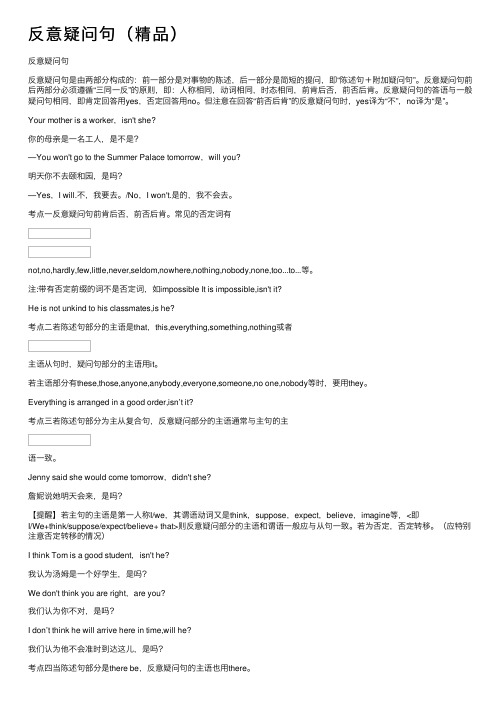
反意疑问句(精品)反意疑问句反意疑问句是由两部分构成的:前⼀部分是对事物的陈述,后⼀部分是简短的提问,即“陈述句+附加疑问句”。
反意疑问句前后两部分必须遵循“三同⼀反”的原则,即:⼈称相同,动词相同,时态相同,前肯后否,前否后肯。
反意疑问句的答语与⼀般疑问句相同,即肯定回答⽤yes,否定回答⽤no。
但注意在回答“前否后肯”的反意疑问句时,yes译为“不”,no译为“是”。
Your mother is a worker,isn't she?你的母亲是⼀名⼯⼈,是不是?—You won't go to the Summer Palace tomorrow,will you?明天你不去颐和园,是吗?—Yes,I will.不,我要去。
/No,I won't.是的,我不会去。
考点⼀反意疑问句前肯后否,前否后肯。
常见的否定词有not,no,hardly,few,little,never,seldom,nowhere,nothing,nobody,none,too...to...等。
注:带有否定前缀的词不是否定词,如impossible It is impossible,isn't it?He is not unkind to his classmates,is he?考点⼆若陈述句部分的主语是that,this,everything,something,nothing或者主语从句时,疑问句部分的主语⽤it。
若主语部分有these,those,anyone,anybody,everyone,someone,no one,nobody等时,要⽤they。
Everything is arranged in a good order,isn’t it?考点三若陈述句部分为主从复合句,反意疑问部分的主语通常与主句的主语⼀致。
Jenny said she would come tomorrow,didn't she?詹妮说她明天会来,是吗?【提醒】若主句的主语是第⼀⼈称I/we,其谓语动词⼜是think,suppose,expect,believe,imagine等,<即I/We+think/suppose/expect/believe+ that>则反意疑问部分的主语和谓语⼀般应与从句⼀致。
反义疑问句讲解及答案

反义疑问句一.句型解释反义疑问句(The Disjunctive Question):即附加疑问句。
它表示提问人的看法,没有把握,需要对方证实。
反义疑问句由两部分组成:前一部分是一个陈述句,后一部分是一个简短的疑问句,两部分的人称时态应保持一致。
1.陈述部分肯定式+疑问部分否定式2.陈述部分否定式+疑问部分肯定式She was ill yesterday, wasn’t she?You didn’t go, did you?二.特殊的句型1.祈使句。
祈使句后一般加上will you或won't you构成反意疑问句,用will you 多表示“请求”,用won't you 多表示提醒对方注意。
例如:Let引导的祈使句有两种情况:1) Let's...,后的反意疑问句用shall we或shan't we。
例如:Let's go home, shall we/ shan't we? 回家吧,好吗?2)Let us/me...后的反意疑问句用will you或won't you。
例如:Let me have a try, will you/won't you?3)祈使句都用will you 或won’t you2.当陈述部分含I think (believe, suppose...)that... 结构时,其反意疑问句须与从句的主、谓语保持一致,注意主句的主语必须是第一人称。
例如:I don't think he will come, will he?若是非第一人称,则与主句的主语相一致He thinks that she will come, doesn’t he?反意疑问句的陈述部分为I(We) don’t think(believe, suppose, consider)+ that从句时,从句为否定意义,问句部分的动词和主语仍与that从句保持一致且用肯定式。
反义疑问句1

反义疑问句(一)一、英文中的反意疑问句。
1、什么是反意疑问句英语中,反意疑问句是由陈述句和附在其后的附加疑问句组成。
其中附加疑问句是对陈述句所说的事实或观点提出疑问,起证实作用,一般用于证实说话者所说的事实或观点。
翻译为“是吗”2.反意疑问句的回答,回答时,如果情况属实,用Yes加上反问句的倒装肯定句;若果情况不属实,则用No加上反问句的倒装否定句。
例如You were moved by your students, weren’t you?情况属实:Yes, I were.情况不属实:No, I weren’t.二、原则:前肯后否/前否后肯如:①You can’t do it, can you? 你不能做它,是吗?②They are very late for the meeting, aren’t they? 他们开会迟到了,是吗?三.当陈述句中含有be动词,助动词,或是情态动词时,反问句部分由这些词加上主语人称代词构成,Be动词包括:am, is, are, was, were助动词有:do, does, did, have(用在完成时), has(用在完成时)等情态动词有:can, could, may, might, must, will, would, shall, should例如:She is a lovely girl, isn’t she?He will go home, __won’t__ __he__?She doesn’t l ike to eat popcorn, __does__ _she___?The baby won’t sleep early, will it?注意:①He has supper at home every day,doesn’t’t he? (不能用hasn’t he?)②They have known the matter, haven’t they? (不能用don’t they?)四.当陈述句中只含有行为动词时,若动词加了s,就用does, 若动词为原形,就用do,动词为过去式,则用did,例如:You cleaned your house last week, _didn’t___ __you__?Your father plays the computer very well, __doesn’t__ ___he _?They look so happy today, _don’t ___ _they___?五.反意疑问句的陈述部分带有little, few, never, hardly, seldom,nobody, nothing, barely, scarcely等否定意义的词时,问句部分用肯定式。
反义疑问句(含解析、例句及详尽用法)
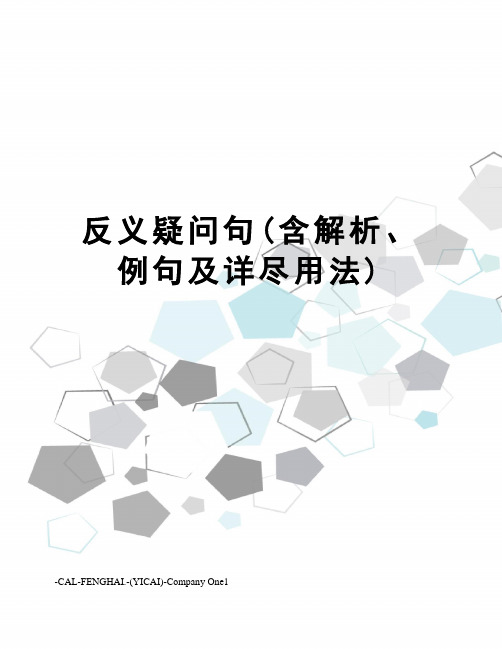
反义疑问句(含解析、例句及详尽用法)-CAL-FENGHAI.-(YICAI)-Company One1反义疑问句一、祈使句的反义疑问句1、肯定祈使句Will you/won’t you2、否定祈使句Will you3、Let的祈使句Let us ...,will you(此处Let us 表示“允许我们...”)Let’s...,shall we (此处Let’s表示“让我们...吧”)Let + 第三人称...,will you二、Must的反义疑问句1、表示“必须” musn’t /needn’tEg. You must go now, needn’t you2、表示“不准”Eg. You musn’t smoke here, must/may you3、表示推测,肯定。
(I’m sure + 从句)Eg. You must be hungry now, aren’t youI’m sure you are hungry now, aren’t youShe must have heard about that, hasn’t sheI’m sure you have heard about that, haven’t youYou must have watched that movie last night, didn’t you(last nigh为具体时间点,所以用一般过去式)三、主语(反义疑问句)+从句主句:I(don’t)think/believe/consider/suppose 或 I’m afraid/sure...后跟从句时,可将从句部分进行反义疑问Eg. I don’t think he will win, will heI think he will win, won’t heShe thinks he will win, doesn’t she(当主句主语不是I时不适用于该用法,此句中的翻译疑问针对的是主句而非从句)四、当句中包含有表示否定意义的副词或不定代词时,反义疑问句用肯定形式Eg. Nothing happened to him, did itIt is unfair, isn’t itHe dislikes watching TV, doesn’t he(该句中含否定意义的是动词而非副词或不定代词,因此不适用于该用法,反义疑问句仍然使用否定形式)五、反义疑问句的回答反义疑问句的回答针对被提问部分的谓语动词,且与回答句前部分的Yes和No 保持一致Eg. A: You haven’t lost the ticket, have youB: D I know it’s hard to get another one at this moment.A. Yes, I haven’tB. No, I haveC. I hope soD. I’m afraid not六、陈述部分的主语与反义疑问句主语保持一致的情况1、OneEg. One can’t be too careful when driving a car, can one/he一个人在开车的时候再怎么小心也不为过。
反义疑问句

特殊的反义疑问句1.Sit down and have a cup of tea ,will you? \ won't you ?Don't be late again, will you ?2.Let's have a rest, shall we? \ shan't we? \ OK?Let us go home now, will you? \won't you?Let meLet him3.What a beautiful girl ,isn't she ?4.I'm quite tall, aren't I?5.Something is wrong with my radio, isn't it?Nothing is serious, is it ?6.Everybody likes Beijing, don't they?Nobody wants to go swimming , does he ? \ do thay ?Neither of them is right, is he ? \ are they ?7.This is my ruler, isn't it ?Those are their books , aren't they ?8.One should do one's duty, shouldn't one?One cannot always do one's duty , can you ?9.What you need is more practice, isn't it ?To learn English well isn't easy ,is it ?Swimming is great fun, isn't it ?10.I wish to go home ,may I ?I wish I were you , may I ?11.He said that it was worth doing ,didn't he ?She said that her father had gone to America , didn't she ?I think he will be back in an hour , won't he ?I don't suppose you are serious , are you ?12.We must study English hard or we can't be good at it , can we ?He is a teacher but his wife is a nurse , isn't she ?13 当must 表示“必须”时,He must work hard next term , mustn't he ?当must 表示“必要”时,They must renew the books , needn't they ?当must 表示“推测”时,She must be very tired , isn't she ?You must have been to Huangshan ,haven't you ?14.You'd better come back early ,hadn't you ? \ shouldn't you ?You'd like to go there , wouldn't you ?You'd rather15.--Tom told me he saw a ghost last night ?-- He did , did he ?-- You mustn't listen to his story .-- Oh , I mustn't , mustn't I ?主谓一致一,谓语动词用单数1.either, neither ,one ,each (of) ,every (of) ,作主语或修饰主语时E.g. Every silver knife ,fork ,spoon has to be counted .2. everybody ,everyone ,everything ,no one ,no body ,anyone等不定代词,what ,whoever 等作主语3.不定式,动名词,从句作主语时谓语动词单数To see is to believe .Singing and dancing are their greatest pleasure .4.国家,机构,书刊,事件名称等作主语:The United Nations was founded in 1945.5.并列主语指同一事物时Ice cream and cake is what she wants after dinner .6.many a + 单数名词(表示许多)Many a student wants to apply for the scholarship .7.mathematics ,measles ,physics ,politics ,news二.谓语动词用复数1.both, few, many, several ,a number of ,the majority of 作主语或修饰主语2.用and 或both...and...连接的两个不同事物The manager and the secretary of the firm are very able man .The editor and publisher of the newspaper is a very able man .3.某些集合名词:few ,people ,the rest ,cattle ,police 等作主语4.正式语中,one of those + 复数名词+ 定从(谓语复数) Jane is one of those persons who always think they are right.the only one of +单数名词+ 定从(谓语单数)三.谓语动词有时单数有时复数1.a good many ,a number of + 复数名词a good deal + U2.family ,army ,class ,crowd ,herd ,public ,group, party ,committee, company ,government ,team等表整体--单数表成员--复数Class 2 is having English class . Class 2 are playing on the sports ground.3.Chinese ,Japanese ,English , French 指语言-- 单数指人民-- 复数4.时间,金钱,距离,体积等作主语---V.单数Twenty dollars is too expensive .表具体的、个别的单位--复数The last two years have been very difficult for us .真题1.In the coming summer holidays,my family ___ going to take a one-week trip to Qingdao.A.isB.areC.wasD.were2.___ pretty your dress is !Where did you get it ?A.HowB.How aC.WhatD.What a3.--There is enough food for the birds ,isn't ____?--No. We need to get some.A.itB.thereC.thatD.this4.--Your monitor id never late for school , is he ?--____.He always comes to school earlier than others .A.Yes ,he is .B.No,he isn'tC.Yes,of courseD.No,sometimes5.--_____ ?--He thinks China is great .A.What does your father think of China ?B.What does your father like in China ?C.Does your father like China ?6.--The film "Hoot"(拯救猫头鹰)is on at the movies .Let's go to see it ,____?--Ok. Let's go .A.will youB.shall weC.won;t weD.don;t you7.Lily is away .She ,with her mother ,____ to Zhalong to see birds .A.has goneB.have goneC.has been8.-- How many teachers are there in your school ?-- About 200. One third of them ___ men teachers.A.haveB.hasC.areD.is9.In our school library there ___a number of books on science and the number of them___growing larger and larger .A.is; areB.are; isC.has ;isD.have ;are10.Nothing is difficult in the world if you put your heart into it ,_____?A.aren't theyB.isn't itC.are theyD.is it。
反意疑问句_精品课件

3. 情态动词(can, will)的反意疑问句(识记)
主语+can/will …, can’t /won’t + 主语?
1 Tom can swim very well, _c_a_n__’t_h_e___? 2 Your parents can’t swim, __c_a_n_t_h_e_y____? 3 All of your friends will come to your party, _w_o_n_’_t_t_h_e_y__? 4 They won’t come,_w_i_ll_t_h_e_y__?
7. 当陈述部分有never,seldom, hardly,few,little, nothing,nobody,none,too…to 等否定意义的词时, 后面的反意疑问句则为肯定形式(易考点)
1.They have never visited his home, h_a_v_e th_e_y__ ? 2.There are few apples in the basket,_a_r_e t_h_e_r_e? 3.He can hardly swim,__c_a_n__h_e__? 4.It has no legs,___d_o_e_s__it___? 5.There is little water in the glass,_i_s__th_e_r_e__? 6.They seldomcome late,__d_o__th_e_y___?
1. be动词(is, are, was, were)的句型:
现在时: 主语+is (are)…, 反义疑问句形式:isn’t (aren’t) + 主语? 过去时: 主语+was (were)…, 反义疑问句形式: wasn’t (weren’t) + 主语?
反义疑问句

情况五:复合句的反意疑问句 情况五 复合句的反意疑问句
陈述部分为主语从句或并列复合句, 陈述部分为主语从句或并列复合句,疑问 部分有三种情况: 部分有三种情况: a. 并列句的疑问部分 谓语动词根据邻 并列句的疑问部分 的疑问部分, 近分句的谓语而定。 近分句的谓语而定。
Mr. Smith has been to Beijing for several times; he shouldn’t he should have been in China now,______________?
陈述部分主语为下列指物的合成代词时, d.陈述部分主语为下列指物的合成代词时 疑 陈述部分主语为下列指物的合成代词时 问部分主语一般用it. 问部分主语一般用
isn’t it Everything is as usual, ________?
e.1)陈述部分含有情态动词 陈述部分含有情态动词must表示“必须” 表示“ 陈述部分含有情态动词 表示 必须”
will you/won ,t you? Sit down and have a cup of tea, _________________ will you? Don ,t be late again, ___________
情况二
祈使句(2) 祈使句(2)
Let’s 表示第一人称 第一人称的祈使句,疑问 第一人称 部分为shall we;而let us/me开头的 ; 开头的 祈使句,其疑问部分为 其疑问部分为will you。 祈使句 其疑问部分为 。
2、结构: 、结构:
结构一: 前肯, 结构一: 前肯,+ 后否
e.g. SARS is scary, isn’t it?
结构二: t scary, is it?
经典反义疑问句

1. 前肯,+ 后否
aren’t _____ you? 1. You are an actor, ________ isn’t ______ he ? 2. He is a good boy, ________ wasn’t ___ it ? 3. It was fine yesterday, _______ 4. You were studying when I called weren’t _____ you ? you last night, __________ isn’t ____? she 5. She is going to visit me, _____ aren’t I 6. I am Chinese, ______ ______?
助动词:
1. You will go to America, ______ won’t ___ you? 2. We have ever been to Shanghai, _________ haven’t ______ we ?
2. 前否,+ 后肯
are you 1. You aren’t an actor, ______ ____ ? is _____ he ? 2. He isn’t a good boy, ______ 3. It wasn’t fine yesterday, ____ was____ it ? 4. It doesn’t rain here, ______ does ____ it ? 5. His sister doesn’t have a headache, does _____ she ? ________ 6. You didn’t call me yesterday, did _____? you _______
